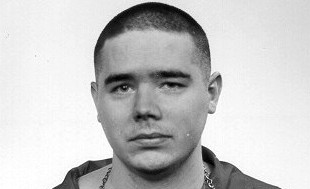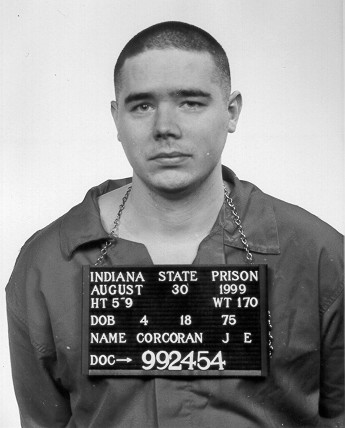Joseph E. Corcoran
ProDeathPenalty
At 17, Joseph Corcoran was accused of shooting his
parents because they were too strict. A jury, though, was unconvinced,
and Corcoran went free.
Five years later, Corcoran was again charged with
murder, this time accused of gunning down his brother, his sister's
fiancé and two other men because he couldn't stand to hear them talking
about him.
This shocking slaying left one of Corcoran's
staunchest supporters, brother James Corcoran, dead, and another, sister
Kelly Nieto, looking at the 1992 slaying of their parents in a whole new
light. ''I knew right then and there that he killed my parents. I know
he did it,'' Ms. Nieto said upon hearing of her brother's death. ''I've
cried so many tears, I'm dry. Everything's gone. He's ruined my life.''
Police say Corcoran walked downstairs in the house he
shared with his sister and opened semiautomatic gunfire on the victims
as they sat in a living room, eating pizza and watching television.
Three were killed on couches, while the fourth apparently attempted to
flee and was shot in the kitchen.
After the shootings, Corcoran asked a neighbor across
the street to call the police. When they arrived, Corcoran told them, ''You
might as well just arrest me.'' Corcoran was jailed on four counts of
murder after giving a statement to police admitting a role in the
slayings. ''Suffice it to say,'' Sgt. Nancy Becher said, ''the suspect
believed the victims were talking about him and he became angry.''
In addition to Corcoran's 30-year-old brother James,
the victims included Ms. Nieto's fiancé, Robert Scott Turner, 32;
Douglas A. Stillwell, 30; and Timothy G. Bricker, 30. Ms. Nieto was at
the store at the time of the shootings. Her 7-year-old daughter was home,
but she was upstairs and police do not believe she saw the shootings.
Her eyes were covered when she was carried out of the home so she would
not see the bodies.
Back at the home two days later, police technicians
were still cleaning up blood stains and gathering evidence. Ms. Nieto
sat outside on her front porch in the muggy afternoon heat, still unable
to understand the crime, or her brother. ''I just think he's sick. I
don't know what made him do it,'' Nieto said. ''I don't know what it was
... maybe it was the heat.''
Neighbors described Corcoran as a quiet loner with ''movie-star
looks'' but no friends. ''All I ever saw him do was work on cars,'' said
next-door neighbor Rose Heintzelman. ''I never saw him have a friend
over, a boy or a girl.''
His past might explain that. Corcoran was 16 when his
parents, Jack and Kathryn, were shot-gunned to death in April 1992 in
their home. Police said Corcoran killed his parents because they were
too strict, then got on a bus and went to school. But prosecutors had
neither witnesses to the shootings nor the murder weapon.
All their evidence was circumstantial: He showed
little emotion when police pulled him out of class to tell him his
parents were dead. He liked guns, and his parents had a large collection
in their home for hunting. No one heard the family dog, fiercely
protective of Kathryn Corcoran, bark to signal an intruder.
Most damaging, Corcoran had offered several friends a
shotgun and money - as much as $500 in one case - to kill his parents.
His friends thought he was joking. Jurors ultimately acquitted Corcoran
after a five-day trial, saying there wasn't enough evidence to convict.
He moved in with his sister, finished high school and got a job. His
past was always lurking, though. Heintzelman said he seemed ''paranoid.''
Donna Carr, who lived two houses away, said she saw
Corcoran carrying several guns into the house two years ago. And when
police entered the house Saturday night, they discovered a stash of 25
to 35 weapons upstairs. Police are still trying to determine if Corcoran
owned all of the weapons and if any are illegal. ''I think that's been
on his mind and on his soul the last five years,'' said neighbor
Margaret Anderson. ''And I think it finally caught up with him.''
UPDATE: The Indiana Supreme Court has ordered
that convicted murderer Joseph Corcoran be put to death by lethal
injection in the early-morning hours of July 21. That is just days
before the eighth anniversary of the grisly killings that occurred on a
hot summer day at a Bayer Avenue home in Fort Wayne in 1997 when
Corcoran loaded a semiautomatic rifle and killed his brother and three
other men.
Corcoran said he shot the men with a semiautomatic
rifle in the living room of the Fort Wayne home he shared with his
brother and sister because he overheard them talking about him.
Corcoran’s attorney said he is seeking a stay in federal court while he
pursues a federal appeal. “It’s procedurally such a complicated case,”
said Joanna McFadden, deputy public defender. “He should be spared
because he has not yet effectively challenged his convictions or really
his death sentence. He now wants to challenge them.”
During trial, Corcoran’s attorneys conceded their
client’s guilt and tried to spare him the death penalty by saying he was
mentally ill and couldn’t appreciate the impact of his actions. Since he
was transferred to death row, court records have indicated Corcoran
believes prison guards have tortured him with the use of an ultrasound
machine that caused him pain and uncontrollable twitching.
The Indiana Supreme Court upheld Corcoran’s sentence
on direct appeal and turned down a post-conviction relief appeal because
Corcoran did not authorize it by the imposed deadline. Both the trial
court and the state’s highest court have found Corcoran competent even
though he suffers from paranoid schizophrenia. They said he wants to die
because he killed four people and deserves to be executed – not because
of delusions.
On the day of sentencing in Allen Superior Judge Fran
Gull’s courtroom, Corcoran said he wanted to waive all his appeals. His
attorney also read this statement from Corcoran: “I can sincerely say
I’m sorry. Not sorrow for me but sorrow for those who have good reason
to hate me, because I am a horrible person, a person who needs to be
punished. Though it may not be seen by others, I grieve in my own way.
My sorrow remains, and I’m burdened with its shame. My actions were
shameful, and they fill even me with contempt.”
A jury from Porter County convicted Corcoran in May
1999 of four counts of murder and recommended he be put to death. He
shot and killed Douglas A. Stilwell, 30; James Corcoran, 30: Robert
Scott Turner, 32; and Timothy G. Bricker, 30. In 1992, Corcoran was
acquitted in the shotgun slayings of his parents in Steuben County.
UPDATE:
A federal judge on Friday granted a
stay of execution for a Fort Wayne man scheduled to be put to death in
three weeks for killing four people, including his brother and his
sister's fiance. Joseph Corcoran, 30, had been scheduled to die July 21,
but District Judge Allen Sharp granted a request that the execution be
blocked so that a federal court can review some of the decisions made by
state courts in the case.
Corcoran's attorney, Alan Freedman, filed the appeal
Monday. Among the decisions being challenged are rulings that Corcoran
was competent to waive further challenges of his sentence even though he
had been diagnosed as paranoid schizophrenic. Corcoran was convicted of
killing four men in 1997 in a Fort Wayne house he shared with his sister
because he heard them talking about him.
Police say Corcoran walked downstairs and opened
semiautomatic gunfire on the victims as they sat in a living room,
eating pizza and watching television. Killed were his brother, James,
30; his sister's fiance, Robert Scott Turner, 32; Douglas A. Stillwell,
30; and Timothy G. Bricker, 30. Sharp's order gives Corcoran until Oct.
25 to file his appeal. The state attorney general's office will then
have 90 days to respond.


